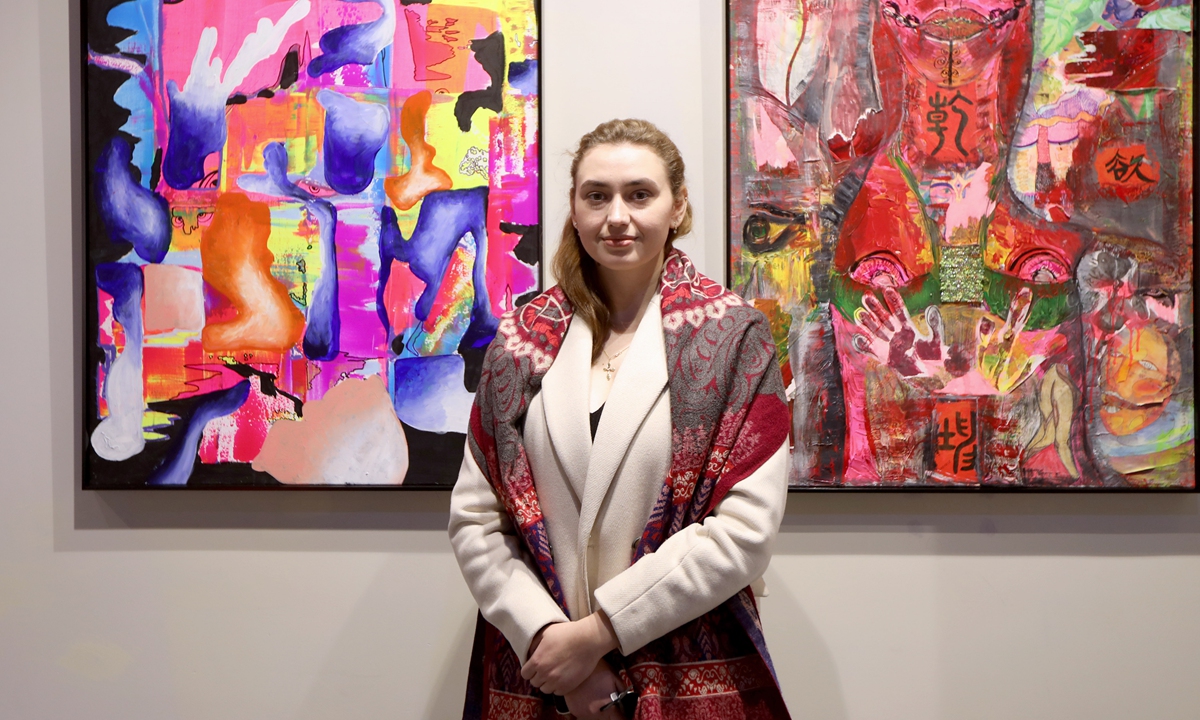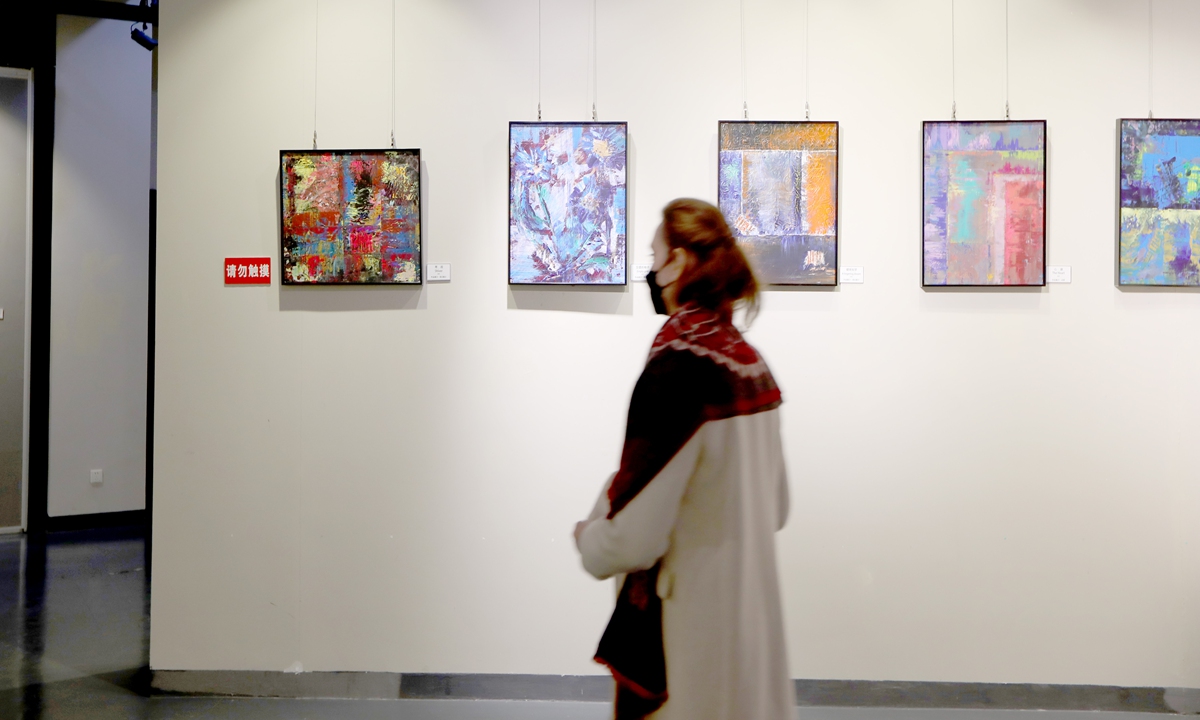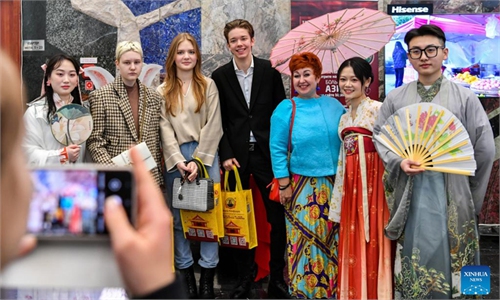IN-DEPTH / IN-DEPTH
Russian female artist immersed in Chinese classic poetry seeks a colorful career in China
Young witnesses
Editor's Note:
China's modernization has been an epic journey over the past decades. Under the leadership of the Communist Party of China (CPC), China has become an attractive destination for many foreigners. Many such expats in the country have fulfilled their career aspirations, while some have found love and started families in China.
Why do they choose to live in China? How do expats in China view and interpret China's achievements and persistence measured from various perspectives?
The Global Times interviewed multiple international residents in China from all walks of life, some of whom have made tangible contributions to China's development, to learn about their understanding of the essence of Chinese culture, and gain an insight into how far China has advanced in its pursuit of social and economic development and national rejuvenation over the last decades.

Having lived in China for a decade and being interested in all the symbolic elements representing the Chinese Spring Festival such as red lanterns, and the Chinese character "fu," which means happiness, blessing, and good fortune, 28-year-old Russian artist Podareva Anastasia spent her Chinese New Year holidays in China this year and visited the annual lantern festival at Yuyuan Garden in Shanghai, one of China's national intangible cultural heritages.
Anastasia created a picture incorporating the theme of the Year of the Rabbit, combining both Chinese traditional elements such as the red lantern, Chinese characters in xiaozhuan, a style of calligraphy, as well as Russian culture to send her best wishes to the spring.
As a poet, a painter, and also a social media influencer with around 600,000 followers on Chinese social media platforms, she greatly enjoys sharing her own poems written in Chinese in addition to discussing her understanding of classical Chinese poetry.
In her eyes, the Chinese Spring Festival symbolizes the wisdom of the Chinese civilization and deep philosophical thought.
"The Spring Festival is a new beginning in Chinese people's minds," she said. She took Chinese character "fu" as an example.
"Placing the character 'fu' upside-down means people can pour out any bad luck and welcome the happiness," she noted. "That's the wisdom of Chinese people."

From student to artist
Many visitors stopped to admire one of Anastasia's creations during their exhibition at the Changshuo Culture Center in Shanghai, which ran from January 7 to mid-January this year. The painting reflects people-to-people exchanges between China and Russia, which depicts Shanghai's skylines made up of symbolic buildings such as the Shanghai Tower.
The exhibition showcased more than 60 oil paintings by Anastasia, reflecting on her understanding of and thoughts on life. The exhibition was guided by the Shanghai People's Association for Friendship with Foreign Countries (SPAFFC).
Jing Ying, vice president of SPAFFC, praised Anastasia's contribution to people-to-people exchanges between the two countries and her positive attitude toward life. "It [the exhibition] represents not only her pursuit of art but also her love for China, for Shanghai, and for life," Jing said at the opening ceremony of the exhibition in Shanghai on January 7.
Graduated from Zhejiang Sci-Tech University in East China's Zhejiang Province in 2017 with a bachelor's degree in Chinese language and literature, Anastasia started her master's degree in art theory from 2017 and graduated in 2021. Fascinated by Chinese culture, she assumed the Chinese name Tang Xilan, which has the artistic conception of Chinese classical culture, as the characters "xi" and "lan" are both taken from The Book of Songs, the earliest collection of poetry in China.
Her interest in Chinese culture aroused her desire to explore and learn more in Chinese poetry as well as Chinese culture. "Chinese culture, such as poetry or philosophy, can calm people's minds and make people think reasonably," she said. Anastasia has written more than 200 poems in Russian, Chinese, and English.
She read a poem "The Return of Spring" to her 600,000 followers via a video clip online, which she had authored, expressing her best wishes during the Spring Festival. The video received nearly 100,000 views and some of the viewers appraised that the poem depicts a beautiful painting with elements of snow and red lanterns.
Even in the face of the COVID-19 pandemic, she learnt to remain mentally peaceful and shared her positive thoughts to others on the internet, encouraging people to overcome their difficulties.
'Fast development'
"When I first came to my school at Zhejiang Sci-Tech University, in 2014, I found that there were almost no commercial centers there. However, five years later, the life quality there has improved a lot, with many businesses developing. Gradually the region has also attracted many foreigners to live and work there," Anastasia said.
Having lived in China for a decade, "I have witnessed its 'fast development,'" Anastasia said.
Anastasia has become accustomed to the pace of life in China and is embracing each new day. After graduation in 2021, she also faced a similar situation as her peers in trying to seek employment.
Thanks to her passion for Chinese traditional culture as well as her continuing efforts in exploring new projects, she got a job to work as a translator at a Chinese-Russian company involved in the trade of liquor and snacks.
This job provides me chances to communicate with people from both Russia and China, and I would like to stay in China to seek more opportunities, she said.
"As an artist, I know it is beneficial for me being alone so I have more time and space to think," Anastasia noted.
She said she would like to introduce a more comprehensive China to her friends in Russia.
China's modernization has been an epic journey over the past decades. Under the leadership of the Communist Party of China (CPC), China has become an attractive destination for many foreigners. Many such expats in the country have fulfilled their career aspirations, while some have found love and started families in China.
Why do they choose to live in China? How do expats in China view and interpret China's achievements and persistence measured from various perspectives?
The Global Times interviewed multiple international residents in China from all walks of life, some of whom have made tangible contributions to China's development, to learn about their understanding of the essence of Chinese culture, and gain an insight into how far China has advanced in its pursuit of social and economic development and national rejuvenation over the last decades.

Podareva Anastasia stands in front of her paintings during her exhibition at the Changshuo Culture Center in Shanghai on January 7, 2023. Photo: Chen Xia/Global Times
Having lived in China for a decade and being interested in all the symbolic elements representing the Chinese Spring Festival such as red lanterns, and the Chinese character "fu," which means happiness, blessing, and good fortune, 28-year-old Russian artist Podareva Anastasia spent her Chinese New Year holidays in China this year and visited the annual lantern festival at Yuyuan Garden in Shanghai, one of China's national intangible cultural heritages.
Anastasia created a picture incorporating the theme of the Year of the Rabbit, combining both Chinese traditional elements such as the red lantern, Chinese characters in xiaozhuan, a style of calligraphy, as well as Russian culture to send her best wishes to the spring.
As a poet, a painter, and also a social media influencer with around 600,000 followers on Chinese social media platforms, she greatly enjoys sharing her own poems written in Chinese in addition to discussing her understanding of classical Chinese poetry.
In her eyes, the Chinese Spring Festival symbolizes the wisdom of the Chinese civilization and deep philosophical thought.
"The Spring Festival is a new beginning in Chinese people's minds," she said. She took Chinese character "fu" as an example.
"Placing the character 'fu' upside-down means people can pour out any bad luck and welcome the happiness," she noted. "That's the wisdom of Chinese people."

Anastasia makes the rounds during her exhibition in Shanghai. Photo: Chen Xia/Global Times
From student to artist
Many visitors stopped to admire one of Anastasia's creations during their exhibition at the Changshuo Culture Center in Shanghai, which ran from January 7 to mid-January this year. The painting reflects people-to-people exchanges between China and Russia, which depicts Shanghai's skylines made up of symbolic buildings such as the Shanghai Tower.
The exhibition showcased more than 60 oil paintings by Anastasia, reflecting on her understanding of and thoughts on life. The exhibition was guided by the Shanghai People's Association for Friendship with Foreign Countries (SPAFFC).
Jing Ying, vice president of SPAFFC, praised Anastasia's contribution to people-to-people exchanges between the two countries and her positive attitude toward life. "It [the exhibition] represents not only her pursuit of art but also her love for China, for Shanghai, and for life," Jing said at the opening ceremony of the exhibition in Shanghai on January 7.
Graduated from Zhejiang Sci-Tech University in East China's Zhejiang Province in 2017 with a bachelor's degree in Chinese language and literature, Anastasia started her master's degree in art theory from 2017 and graduated in 2021. Fascinated by Chinese culture, she assumed the Chinese name Tang Xilan, which has the artistic conception of Chinese classical culture, as the characters "xi" and "lan" are both taken from The Book of Songs, the earliest collection of poetry in China.
Her interest in Chinese culture aroused her desire to explore and learn more in Chinese poetry as well as Chinese culture. "Chinese culture, such as poetry or philosophy, can calm people's minds and make people think reasonably," she said. Anastasia has written more than 200 poems in Russian, Chinese, and English.
She read a poem "The Return of Spring" to her 600,000 followers via a video clip online, which she had authored, expressing her best wishes during the Spring Festival. The video received nearly 100,000 views and some of the viewers appraised that the poem depicts a beautiful painting with elements of snow and red lanterns.
Even in the face of the COVID-19 pandemic, she learnt to remain mentally peaceful and shared her positive thoughts to others on the internet, encouraging people to overcome their difficulties.
'Fast development'
"When I first came to my school at Zhejiang Sci-Tech University, in 2014, I found that there were almost no commercial centers there. However, five years later, the life quality there has improved a lot, with many businesses developing. Gradually the region has also attracted many foreigners to live and work there," Anastasia said.
Having lived in China for a decade, "I have witnessed its 'fast development,'" Anastasia said.
Anastasia has become accustomed to the pace of life in China and is embracing each new day. After graduation in 2021, she also faced a similar situation as her peers in trying to seek employment.
Thanks to her passion for Chinese traditional culture as well as her continuing efforts in exploring new projects, she got a job to work as a translator at a Chinese-Russian company involved in the trade of liquor and snacks.
This job provides me chances to communicate with people from both Russia and China, and I would like to stay in China to seek more opportunities, she said.
"As an artist, I know it is beneficial for me being alone so I have more time and space to think," Anastasia noted.
She said she would like to introduce a more comprehensive China to her friends in Russia.

